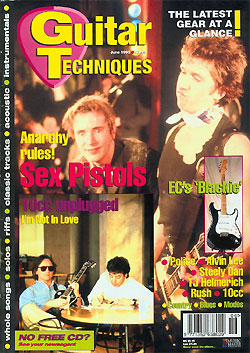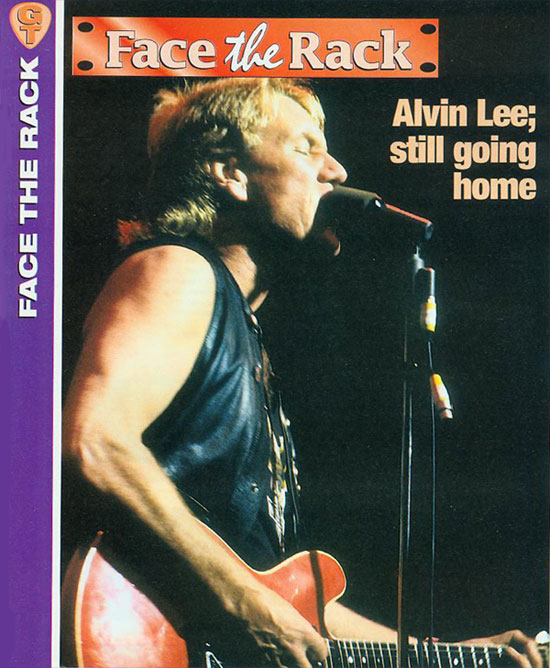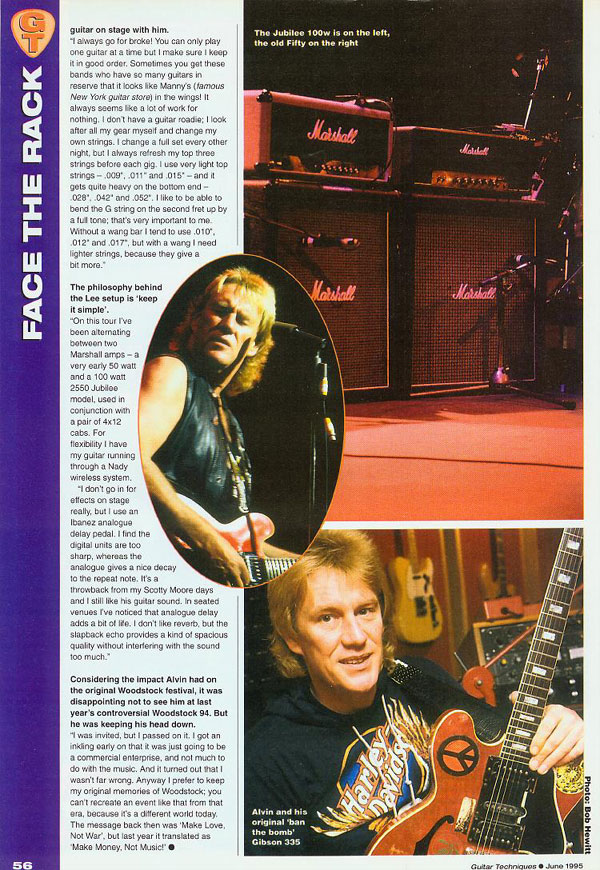|
Guitar Techniques Magazine
June
1995 – Alvin Lee
Face The Rack – “Alvin Lee; Is Still Going Home”
More than a
quarter of a century has passed since Ten Years After took
Woodstock by storm..
But, as Mark
Cunningham discovers, Alvin Lee is back on the road,
proving there’s more life than ever in those lightning
fingers.
“I Hear You
Knocking” (similar to Dave Edmunds version) and The
Beatles “I Want You” (she’s so heavy); the latter
featuring a guest appearance from Alvin’s long-time
mucker, George Harrison.
Alvin, 50, says:
“My career has turned full circle now, and like a lot of
my contemporaries, I’ve gone back to my musical roots.
It’s where I feel most comfortable. We even recorded
“Nineteen – Ninety – Four like the old days – all in one
room. With very few overdubs, to keep the whole thing
sounding natural and raw”.
As A Guitarist,
Alvin’s Influences Are As Diverse As They Come:
“Very much so” he
agrees. “In my early days I listened to a lot of jazz
because my parents were real jazz and blues fans. There
was a great guitar player called Charlie Christian who
worked with Benny Goodman, and a lot of those guys like
Count Basie and Louis Jordan had a huge influence on the
swing aspects of early rock `n´ roll. Then there’s Chuck
Berry, “Sun” period Elvis, Jerry Lee Lewis, Little Richard
and the blues guys like Big Bill Broonzy, Muddy Waters and
John Lee Hooker. Every time I hear those old records I
smile”.
“But there are
other not so obvious influences at work in my guitar
playing. I’d like to think I’ve learned a lot from
listening to country man Merle Travis, Segovia’s classical
work and the great flamenco guitarist Juan Serano. I’ve
certainly heard a lot more of that style since I moved to
live in Barcelona, and I’m sure It’s rubbing off on me,
albeit subtly. Unfortunately, it’s hard to transpose those
flavours to the stage style of rock `n` roll , although
I’m investigating flamenco as a hobby”.

In The UK, Alvin
On Stage Has Become A Rare Sight Over Recent Years:
“To be honest,” he
says, “The Ten Years After experience burned me out. We
began as a great club act, playing at the Marquee and
places where the sweat was literally dripping down the
walls. That’s what live music was about for me, but then
after Woodstock things got out of control and we got
catapulted into the American arena scene, where that
interactive relationship with the audience just dissolved.
It all became very false and I think we lost touch with
the reality that playing in Britain gives you. The
situation has turned around now because, due to a
longstanding problem with the Internal Revenue Service
(IRS) I don’t feel inclined to tour the States. But this
year will see me playing my first ever dates in Russia and
Poland, which will be interesting, although very cold. “I
know that people want to hear me play things like “Love
Like A Man” and “I’m Going Home” and although I used to
revolt against the idea, I don’t have a problem with it
now. I remember going to see Jerry Lee Lewis, and it was
during his country period where he didn’t even touch my
favourites like “Great Balls Of Fire” I was sick as a
pig, so I know not to neglect some of the more well known Ten Years After
material”.
Surprisingly,
Alvin’s Classic 1958 “Ban The Bomb” (Peace Sticker) Gibson
ES-335 - Is Absent On His
Latest Live Trek:
“It’s still my
favourite guitar but it’s become too valuable for me to
risk taking it on the road, although I used it on quite a
few of the tracks on “Nineteen-Ninety-Four”. If anything
happened to that it would be a disaster. These days I’m
playing a red Heritage Alvin Lee 335 type model with a
Kahler wang bar. In fact, an airline broke the neck a few
months ago and they put a new one on, so now it’s as good
as new. But you couldn’t risk that with my Gibson.
It wouldn’t feel
the same. Between the hum-buckers on the Heritage there
are extra Stratocaster pickups with their own volume
control. It was effectively built for me by the same
people who made my famous 1958 Gibson 335. When Gibson
left Kalamazoo and renamed the company Heritage”.
Alvin Obviously
Has Great Faith In His Strings; He Insists On Taking Only
One Guitar On Stage With Him:
“I always go for
broke! You can only play one guitar at a time, but I make
sure I keep it in good order. Sometimes you get these
bands who have so many guitars in reserve, that it looks
like Manny’s (Famous New York City Guitar Store) in the
wings! It always seems like a lot of work for nothing. I
don’t have a guitar roadie; I look after all my gear
myself, and change my own strings. I change a full set
every other night, but I always refresh my top three
strings before each gig. I use very light top strings .009
- .011 and .015 – and it gets quite heavy on the bottom
end - .028 - .042 - .052. I like to be able to bend the G
string on the second fret, up by a full tone; that’s very
important to me. Without a wang bar I tend to use .010 -
.012 and .017, but with a wang I need lighter strings,
because they give a bit more”.
The Philosophy
Behind The Lee Set-Up Is – “Keep It Simple”.
“On this tour I’ve
been altering between two Marshall amps, a very early 50
watt and a 100 watt 2550 Jubilee model, used in
conjunction with a pair of 4 x 12 cabinets. For
flexibility, I have my guitar running through a Nady
wireless system. “I don’t go in for effects on stage
really, but I use an Ibanez analogue delay pedal. I find
the digital units are too sharp, where as the analogue
gives a nice delay to the repeat note. It’s a throwback
from my Scotty Moore days and I still like his guitar
sound. In seated venues I’ve noticed that analogue delay
adds a bit of life. I don’t like reverb, but the slap-back
echo provides a kind of spacious quality without
interfering with the sound too much”.
Considering The
Impact Alvin Had On The Original Woodstock Festival. It
Was Disappointing Not To See Him At Last Year’s
Controversial Woodstock 1994.
But He Was Keeping
His Head Down:
“I was invited, but I passed on it. I got an inkling early
on that it was just going to be a commercial enterprise,
and not much to do with the music. And it turned out that
I wasn’t far wrong. Anyway I prefer to keep my original
memories of Woodstock; you can’t recreate an event like
that era, because it’s a different world today. The
message back then was “Make Love, Not War”, but at
Woodstock 1994 it translated into “Make Money, Not Music”
!

|